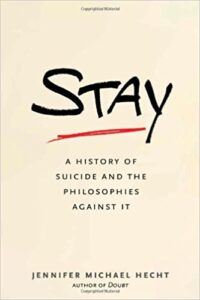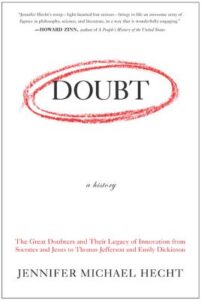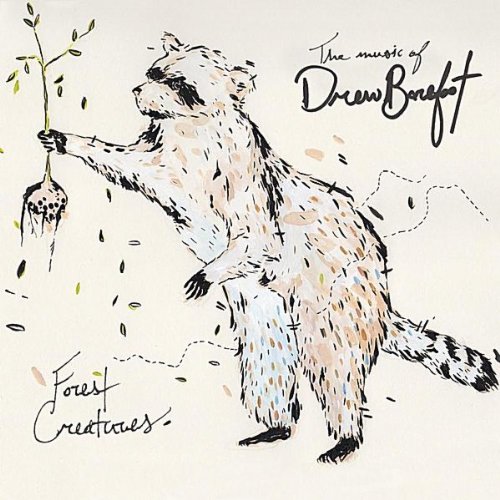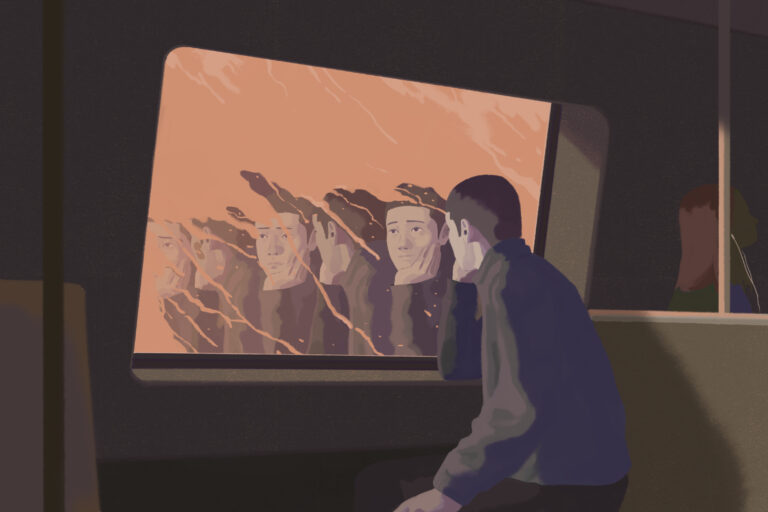Jennifer Michael Hecht
‘We Believe Each Other Into Being’
“We are indebted to one another and the debt is a kind of faith — a beautiful, difficult, strange faith. We believe each other into being.” That’s the message the philosopher, poet, and historian, Jennifer Michael Hecht, puts at the center of her unusual writing about suicide. She’s traced how Western civilization has, at times, demonized those who died by suicide, and, at times, celebrated it as a moral freedom. She has struggled with suicidal places in her life and lost friends to it. She proposes a new cultural understanding based on our essential need for each other.
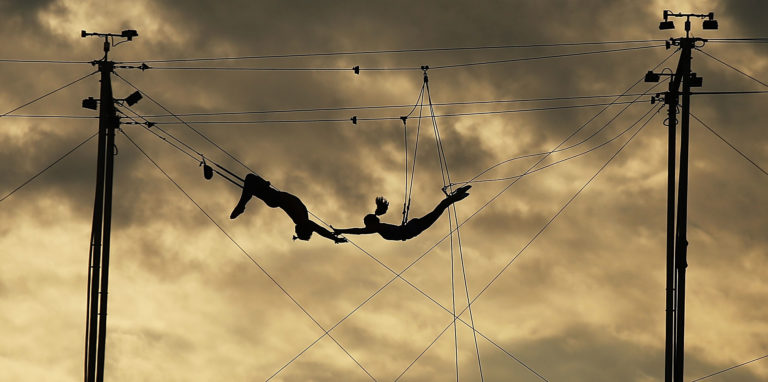
Image by Spencer Platt/Getty Images.
Guest
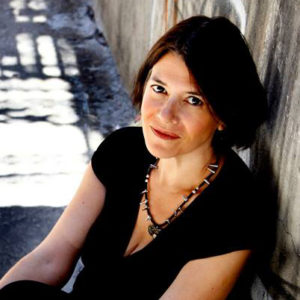
Jennifer Michael Hecht is the author of Stay: A History of Suicide and the Philosophies Against It, Doubt: A History, and Who Said.
Transcript
Krista Tippett, host: Jennifer Michael Hecht writes this: “We are indebted to one another and the debt is a kind of faith — a beautiful, difficult, strange faith. We believe each other into being.” That’s the message this philosopher, poet, and historian puts at the center of her unusual writing about suicide. She’s traced how Western civilization has at times demonized those who died by suicide, at times celebrated it as a moral freedom. She has struggled with suicidal places in her life and lost friends to it. And she proposes a new cultural understanding, based not on morality or on rights, and on our essential need for each other.
[music: “Seven League Boots” by Zoe Keating]
Dr. Jennifer Michael Hecht: Your staying alive means so much more than you really know or that anyone is aware of at this moment. But we’re in it together in this profound way, and you can take some strength from that.
Tippett: I’m Krista Tippett, and this is On Being.
I spoke with Jennifer Michael Hecht in 2014, after she published Stay: A History of Suicide and the Philosophies Against It. And I also interviewed her once before, in the early years of this show, about her glowing work on the forgotten history of doubt as a graceful life philosophy.
Tippett: I can’t remember if I asked you this when I talked to you before. This has just become a stock question for me. I ask everybody this question to begin, which is, was there a spiritual, a religious background to your childhood?
Dr. Hecht: Yes, there was. My father was a Jewish atheist physicist. Still is.
Tippett: That’s a great tradition. That’s a great lineage to me.
Dr. Hecht: Yes, it really is. And, my mom believed in Judaism and the Jewish God, and she was in charge of our spirituality, until, at ten, I decided, no this is not true.
Tippett: [laughs] OK.
Dr. Hecht: But I did all the stuff before that. I went to temple more than your average bear.
Tippett: I wonder, as you got into the subject of suicide, are there early associations for you with suicide, or anything that even just came to you as you were writing this book?
Dr. Hecht: Well, yeah. I’ve lived with suicidal thoughts at times. So it’s all very keen to me.
Tippett: Hm. I don’t think you really — you don’t really talk about that in the book, do you?
Dr. Hecht: Not in the book, but I talk about — in the preface, I talk about my own dark times.
Tippett: Yeah.
Dr. Hecht: And now, in discussing with people afterwards, it just seemed more relevant to talk about my own.
Tippett: And then it seems like you really became mobilized to pick this up and worry with it, and think about it, and think about it historically. After, not just one, but two peers…
Dr. Hecht: Yeah, about a year apart.
Tippett: … young women …
Dr. Hecht: Yeah.
Tippett: …fellow poets and friends, killed themselves in a short period of time.
Dr. Hecht: That’s right. We had all been up at Columbia getting our PhDs at the same time, them in literature, and I in history of science. But we were all poets. So we knew each other then, and to varying degrees saw each other across the ten or whatever years that followed, just because we were poets, go to the conferences and stuff, and parties, and see each other everywhere. But when the first friend did it, I had just started to come out of a very dark period myself. And then when the second friend did it, who was also friends with the first …
Tippett: Was that Rachel?
Dr. Hecht: Yeah.
Tippett: Mm-hmm.
Dr. Hecht: And — Rachel Wetzsteon. And, yeah, I wrote something on the internet, not thinking I was really talking to more than a few other poets. But, yeah, it got around, too, and that’s when I started to think very seriously, because I was getting emails from people who were saying that these very little things I’d done had helped them tremendously. And so it was really — then it was a mission. I’m a historian and I read a great deal of philosophy through history, so I had these impulses of ideas, but I really had to search them down and find out the nuances and that did bring more information.
But I also want to add — look, I’m someone who speaks to people about living a deep, meaningful life without a definite spiritual guideline, and that made me very attentive to this. When I was feeling at my worst, I very much appreciated reading Mary Karr’s Lit. She starts out — she’s an atheist, she’s an alcoholic, she’s depressed, very depressed. And eventually A.A. convinces her to get the higher power, and then her son becomes interested in Catholicism, and she’s a Catholic by the end. And that wasn’t helping me at all. And so I was really thinking, what can a person do when they’re at their absolute wits’ end, but they can’t fall down on their knees and pray? It doesn’t work for them. For them, it’s like talking to your hand. It just isn’t helpful.
Tippett: Yeah, and you say that, and — interestingly, what you have been doing in your reflection on this is actually pulling the lens back to think about the human and humane context of suicide …
Dr. Hecht: Yes.
Tippett: … which is life, which is a commitment to life.
Dr. Hecht: Yes, and also very specifically to other human beings.
Tippett: Right. It’s a communal grounding for an argument against suicide – just, essentially, that we need each other.
Dr. Hecht: Yeah, the communitarian is what struck me first. And that was very much — I was sitting alone in my room, thinking this out. And when Rachel did it, too, I felt so much pain, even though we were not super close, that I was thinking in terms of how much you hurt other people when you do this. And so I shouldn’t do it. And within seconds, I was on the other side of that — seeing that we’re trained and raised to feel very individualistic, but it’s not true. Right?
Tippett: Yeah. Right.
Dr. Hecht: We gain and lose weight together, we smoke and stop together, we have a third child together. We’re really in each other’s worlds.
Tippett: And you point out, as you do so well with your large sense of history and philosophy, that the history of Western religion and philosophy is among many other things, one long dialogue on the propriety of taking your own life. I mean, I find this so helpful in your book, how you look at how we as human beings, as a species, and as a culture, have been grappling with this — and the kind of drama. There’s a trajectory there, right? There’s a…
Dr. Hecht: Yes.
Tippett: …there’s a back and forth, and a development.
Dr. Hecht: Yeah.
Tippett: So let’s, I mean, let’s talk about that. Tell some of that story.
Dr. Hecht: Well, let’s do a real quick, simple version, which is that the ancient world had a certain amount of ambivalence about suicide. They lauded some famous suicides, but their literature — Socrates said don’t do it, Plato said don’t do it, all for community. Aristotle said don’t do it. And Seneca and Socrates are both thought of as famous suicides.
Tippett: Right. I was going to say Socrates said don’t do it, but he did it.
Dr. Hecht: But he did it. But they were compelled by government. So it was in that very room where he was about to drink the hemlock that he told his people, you can’t. Everyone has to stay for each other, unless you’re compelled in the way I am. But Seneca also was — he killed himself when Nero, the emperor Nero, commanded him to. So it’s not really what we today would think of as suicide. But Seneca wrote beautifully against suicide. He said at one point that life is really hard. And he talked about it in really interesting ways. But then there’s another passage where he says he’d like to kill himself, but instead of being courage from him, it would take away courage from his aging father. And so, he says, “Sometimes, to live is an act of courage.” And that’s been quoted many times, that last little line. And what’s important is to note that the ancient world could, in certain sacrifice-for-the-community cases, they could appreciate this kind of gesture. But many scholars have seen Jesus as a suicide. It says in John — “No one takes my life,” Jesus says. “No one takes my life, I lay it down myself.” And …
Tippett: We see that in that same sphere of a willing sacrifice on behalf of something greater.
Dr. Hecht: Yes. And you add to it the martyrs. The martyrs problem was huge. And then once Constantine makes Christianity no longer illegal in 313, there’s no point in it anymore for the church. The church is just getting to be more than a bunch of scattered little groups. But the church doesn’t want to lose members anymore, and it’s not illegal, so it doesn’t make any sense any more. But people kept doing it. It was part of that culture. And by now, of course, they’re doing it mostly by themselves. They’re killing themselves to be a martyr for this religion. And the church starts having, at almost every council they have in the 300s, 400s, 500s, 600s, all these councils add notions of, if you kill yourself and say it’s piety, you’re going to be excommunicated.
Tippett: It was preventative.
Dr. Hecht: It was. And we have records that make that clear, of people discussing their thinking. And very often, also, discussing the tug between God and the devil. And the devil was, by the late Middle Ages, very much associated with suicide.
Tippett: And I think the point you make, I mean, what you’re saying is provocative. I think what came down, then, into the Christian West eventually was not these kinds of displays of punishment, but a sense that this is wrong, that God forbids it. And I think another provocative point you make is that that as the only reason not to commit suicide [Editor’s note: Mental health professionals have moved to less stigmatizing language, now using “died by suicide.”] was actually kind of dehumanizing. That it …
Dr. Hecht: Sure.
Tippett: Right?
Dr. Hecht: But …
Tippett: In your view?
Dr. Hecht: … what’s important — well, there are lots of ways of looking at it, but the key bit for me is that the Enlightenment saw it as a clear goal to stop the church being involved in this…
Tippett: Right.
Dr. Hecht: … and stop — and to argue against that God was so concerned with your particular details, and what you did, and also just saying the church doesn’t have any business in this.
Tippett: And then in reaction, Enlightenment ends up kind of christening it as a form of moral freedom.
Dr. Hecht: That’s right. And saying it’s sort of one of the key pillars of our autonomy.
Tippett: Right.
Dr. Hecht: That we have the right to end all this. And it really just kind of spread. And we think of it as the whole secular world holding these views, but we also think of Camus as being a figure …
Tippett: Yes.
Dr. Hecht: … in that, but when you actually go back and read The Myth of Sisyphus, Camus definitely starts the thing with, “There’s only one philosophical question and that’s suicide.” But that invitation is very misleading, because he goes through the whole book arguing against suicide.
Tippett: Right.
Dr. Hecht: He said life is absurd, there’s no outer reason that you have to, but that suicide is the wrong step. That life is worth living, this absurd, strange thing should be witnessed, and it’s vital that you, essentially, have some respect for your future self, who’s going to know things you don’t know.
[music: “Where Are You Driving” by Laura Veirs]
Tippett: I’m Krista Tippett and this is On Being. Today, with philosopher and historian Jennifer Michael Hecht.
Tippett: I have to say that this Camus example that you gave is very striking. I mean, I’m one of, I think, many people who, in my 20s somewhere, or when this was assigned to me in college, read that first line of The Myth of Sisyphus. “There is but one truly serious philosophical problem, and that is suicide. Judging whether life is or is not worth living amounts to answering the fundamental question.” But I don’t think that I either got to the end or really took in…
Dr. Hecht: Right.
Tippett: … what you’re saying was really that the whole sweep of his argument.
Dr. Hecht: Yeah.
Tippett: It’s interesting. I interviewed Brian Greene recently, and he brought up Camus and The Myth of Sisyphus. And here is a brilliant person, but I think the way he internalized that is the way most of us internalized it.
Dr. Hecht: Though I will say that when I give talks, the only consistent book that people come up to me and say, this helped me, is Camus’ Myth of Sisyphus.
Tippett: Really?
Dr. Hecht: So, if they read it…
Tippett: If they read it.
Dr. Hecht: …it helps them save their lives. They tell me over and over. It’s remarkable.
Tippett: Interesting.
Dr. Hecht: The idea that life is horrible, but absurd, and that we can embrace the weird side, and stop trying to make everything right and reasonable, stop trying to dot all the i’s or make it seem fair, but embrace the absurd, and be interested in the future, and imagine Sisyphus happy — that’s what they get when they really read it.
Tippett: So, I want to come back to this — let’s just say, now, 21st century, there’s an aura of, or at least a possibility of nobility, even kind of romance in a dark way. There’s a noble lineage, also, if nothing else, right?
Dr. Hecht: Right?
Tippett: I mean, it’s…
Dr. Hecht: Correct.
Tippett: … Socrates, it’s Sylvia Plath, it’s Virginia Woolf, it’s Ernest Hemingway, it’s Goethe’s Young Werther, it’s Marilyn Monroe, David Foster Wallace…
Dr. Hecht: I guess, but I have difficulties with all of those. I mean, Sylvia Plath’s son, who was in the other room when she did it…
Tippett: Right.
Dr. Hecht: … 40 years later, kills himself.
Tippett: But I learned that first from you. I didn’t know that. And it’s not that there’s anything — there’s not …
Dr. Hecht: The poetry world knew.
Tippett: The thing about the Sylvia Plath example, it’s not like it’s a happy thing. It’s not like you look at that and say how romantic, but this list of people I just read, and the list is much longer, it’s amazing, brilliant lives. Right?
Dr. Hecht: Yeah, but it’s also — you’re absolutely right that there’s a way of thinking of this as sort of grand. But let’s also point out that a great many people who kill themselves speak about their being a burden. They’re afraid they’re a burden on other people.
Tippett: Yeah.
Dr. Hecht: Because they’ve been depressed a while, or because they’ve just had a humiliating blow, and they think very poorly of themselves at the moment. Break up of a relationship, trouble at work, but people have to know clearly, and in a simple sentence, your suicide will be a much greater burden — exponentially greater.
Tippett: I think what this gets at is — and this really was with me as I was getting ready to talk to you — an aspect of suicide as a human phenomenon that we don’t actually go into, which is the effect it has on those who are left behind.
Dr. Hecht: Yeah.
Tippett: Right?
Dr. Hecht: And importantly, not just family and friends who get hit very hard, but don’t always repeat it, but in that slightly wider area. Again, I’ve gotten letters, actual physical letters, telling me that someone at quite a distance made it — they became a little obsessed with it.
Tippett: So, I don’t think I’ve ever talked about this in an interview before. When I was in my 20s, I had someone I cared about commit suicide. And it was actually somebody I had been very close to, as well as someone who I had very much looked up to, professionally. I mean, at the point at which he died, we were living in different countries. But, how dislocating. It wasn’t just a grief. It was — it’s not just another — it’s not just a loss or a death. The stages …
Dr. Hecht: Yeah.
Tippett: First of all, a total disbelief.
Dr. Hecht: That’s right.
Tippett: Like, I really thought people were lying. Right? I mean, I really — first, I thought, this is some ridiculous joke, or some kind of — somebody’s making this up. And then the guilt. And my understanding is that this is true, and as you say, not just in those immediate circles, of course in those immediate circles. But looking back through the last phone call that we’d had.
Dr. Hecht: Yeah. Oh, yeah, did a lot of that.
Tippett: And how I had been …
Dr. Hecht: Fetishized the last email.
Tippett: And I had been dismissive — yeah. And then later, thinking — really torturing myself. Could I have made a difference in that phone call? And then the thing that comes that I don’t think people know how to talk about, certainly the closest loved ones — the anger.
Dr. Hecht: Mm-hmm.
Tippett: Right? Because this…
Dr. Hecht: Oh, yeah.
Tippett: … sense of the selfishness of it, right?
Dr. Hecht: I’ve seen that response a lot.
Tippett: Of damage. Yeah. And, then the guilt over the anger.
Dr. Hecht: That’s right. Sure.
Tippett: And this is just me in one of these circles, outside the middle. So I wonder if this is something you get in opening up the subject and the way you’re doing it…
Dr. Hecht: Yeah.
Tippett: … which is this communal way that creates a space to talk about this.
Dr. Hecht: Yeah. Absolutely. And it’s an extreme reaction, but lots of people die after a suicide. They come in groups. I talk to some people…
Tippett: Right.
Dr. Hecht: … in the army, they said it comes in groups.
Tippett: Right. So, then that’s really a very serious thing you are pointing out, which is absolutely documented in many ways, that one of the best predictors of suicide is knowing a suicide.
Dr. Hecht: Right. But don’t ever forget the flip side, which is your staying alive means so much more than you really know, or that anyone is aware of at this moment. But we’re in it together in this profound way, and you can take some strength from that. I think that’s, for me, that’s been very important. Just feel like, obviously we’re not individuals. Wow, how could I have thought that we were on that kind of level? And it’s funny, because my two arguments, that you owe it to other people and that you owe it to your future self, are both about looking at what the individual means. Because when you look at a person within a group, and all the trends we follow, the clothes, the car, the not-car, all these trends that we follow, you realize the extent to which we’re enmeshed. And when you look at yourself and realize that you have fallen in and out of love with the same person, you have fought with friends thinking you’ll never speak to them again, and then you love them again…
Tippett: Yeah, right.
Dr. Hecht: … we have different moods that profoundly change our outlook, and it’s not right to let your worst one murder all the others.
Tippett: And I know this is something you’ve thought about, but you talked about your dark times.
Dr. Hecht: Right.
Tippett: It’s hard. You say — this is your non-religious argument against suicide. I’m just, in a way, paraphrasing what you just said. “So I want to say this and forgive me the strangeness of it.” This was from that original article you wrote. “Don’t kill yourself. Life has always been almost too hard to bear for a lot of people, a lot of the time.” But it’s very hard to argue with depression.
Dr. Hecht: It is. But it is possible. It is possible. I think if the message you are sending yourself is “this is not how I always feel,” sometimes you just have to wait. And because even when you’re terribly depressed, you’re not actually, actively suicidal all that time. That comes and goes even in the worst.
Tippett: Yeah.
Dr. Hecht: And you just have to — it’s a great idea to write yourself a note saying, “I am happy right now despite previous depressions. Please do not do anything to inhibit this from happening again.” And go read it when you’re down. There it is in your handwriting. Someone actually wrote that to me when they were telling me how much Stay had helped them. They told me this little trick that they used, and I thought it was brilliant. Remind your mood that the other mood exists. Because depression’s particularly — one of its definitions is that within depression you can’t see that you’ve ever not been depressed …
Tippett: Right. You can’t see beyond it.
Dr. Hecht: …or that you won’t be depressed. Right.
Tippett: You can’t see outside it. You can’t imagine outside it.
Dr. Hecht: No, you can’t. But if you put it in your head beforehand, it can help. I mean, look, we all sometimes feel a sort of fleeting homicidal thought, right, when someone is just being incredibly frustrating or ruining everything or whatever, and you just think, “I wish they were gone”?
Tippett: I’ve never had that thought.
Dr. Hecht: You don’t have to even think about it. Right? Because you know …
Tippett: Right, OK. Yeah.
Dr. Hecht: You know that murder is out of the question. And I think that with a little bit of thought, suicide can equally be out of the question. We have tons of stats that say people go to the Golden Gate Bridge, you can usually …
Tippett: What do they call that? A suicide magnet.
Dr. Hecht: It is. But if you go to a bridge that has the fence up, a suicide fence up, the people just go home. They don’t go to another bridge. They usually survive it. We have actual stats on this.
Tippett: So what does that say to you? What does that …
Dr. Hecht: That it’s impulsive. That it’s tremendously impulsive. And that if you can get past the impulse, and if you can put a conceptual barrier in your head, that it can work in the same way that that chain link fence can. You just — you’ve put up a barrier. You’ve talked to yourself about this. And don’t argue with yourself. Get in bed and feel terrible, or go get help, or, jeez, playing a video game sometimes takes my mind off misery. There’s ways to get through the worst, and, really, when I’m starting out, what I’m starting out with is really just the idea of, yeah, sometimes life, for some of us, can be unbelievably painful. But don’t do this one thing. Your well-being is important to other people and it’s not — a lot of soldiers in the military, suicide crisis is terrible.
Tippett: Yeah.
Dr. Hecht: You know, they feel …
Tippett: What is that — is this right? That more military personnel are dying by suicide than dying in battle in these recent years?
Dr. Hecht: Yeah, in 2012, that was clear and shocked everybody.
Tippett: Yeah.
Dr. Hecht: Yeah, and they — well, you go on.
Tippett: Well, so here’s one way you say this. “None of us” — and this is very simple, but I find this a very striking statement — “None of us can truly know what we mean to other people, and none of us can know what our future self will experience.” But I think that the specter of suicide, alongside the specter of military suicide, that’s most present now, is teenage suicide.
Dr. Hecht: Mm-hmm.
Tippett: Right? And …
Dr. Hecht: Yeah. Colleges are …
Tippett: … seems to be fueled also somehow by the internet. And that is a time when people are even more susceptible to this way we are, which you describe, which is being part of a group and being very influenced by those around us. But also it’s a time of life when somebody can say this very reasonable thing, “You can’t truly know what you mean to other people, and you can’t know what your future self will experience,” but that’s a time of life…
Dr. Hecht: That’s right.
Tippett: … when you’re inside this bubble that you can’t see or imagine beyond.
Dr. Hecht: Yeah, exactly. But it’s also true that they sometimes have experienced a suicide and feel shame and guilt, and the easiest way to get them to feel better is to notice that they do have some control over future such experiences by making sure not to start the cycle again. And they’re a population that, in many cases, their lives are being sort of run from outside, either because they’re in the army, or college, or high school. And so we really have to dedicate ourselves to looking sharp on this. It’s not fair to have so much control over people’s lives and finding them in this way.
Tippett: Right. I think that’s the question. So what can we do? I mean, you’re making this really communal plea, so how do you see that working its way out?
Dr. Hecht: What can I do other than offer these things which I’ve found helpful, and things that people have most said back to me, that they find helpful. It’s funny, sometimes people argue with me, a lot of times people argue with me, that suicide is a right. It’s a right. And I say, is it right for a teenager to do this? No. Is it right for a parent of a young child to do it? No. So, who is this guy who doesn’t have anybody who loves him a lot, or those people are perfectly fine with his decision and he’s of sound mind, and he decides he wants — this is a very rare person. And, if we’re going to say that this is a right over and over to people, what are we giving them the right to? It’s not the right to free speech or the right to freedom of — this is the right to die when they’re not in trouble. And I should have led with, if your physician and people in your family think that it might be time for you to go, that seems to me a different conversation.
Tippett: Yeah, you’re not talking about end of life.
Dr. Hecht: No, no.
[music: “Not Here, Not Tonight” by Near The Parenthesis]
Tippett: After a short break, more with Jennifer Michael Hecht. We chose to air this episode this week, as we enter into the shortest days of the year, to amplify the call to life that echoes to us even in a bleak pandemic midwinter. And, as this hard December has unfolded I’ve felt a desire to sit with the far-flung community that listens to On Being. So we’re holding a virtual gathering for an hour on Monday, December 21 — the winter solstice — to ponder all we’re carrying out of this year and into next. I’ll be there with my social healing colleague Lucas Johnson. You can register now and invite others at onbeing.org/events. All are welcome.
[music: “Not Here, Not Tonight” by Near The Parenthesis]
Tippett: I’m Krista Tippett and this is On Being. Today, in conversation with the poet, philosopher, and historian Jennifer Michael Hecht. She’s traced how Western civilization has at times demonized those who died by suicide, at times celebrated it as a moral freedom. She has struggled with suicidal places in her life and lost friends to it. As a scholar, she proposed a new cultural understanding based not on morality or on rights, but on our essential need for each other.
Tippett: One thing I kept thinking about when I was reading you is — I’m not sure if this is completely related, but bear with me.
Dr. Hecht: Go ahead.
Tippett: Anthony Appiah is a philosopher at Princeton.
Dr. Hecht: Right. I cite him in the book.
Tippett: Oh, OK. And he’s done a lot of work on how moral change happens, and it’s often a reversal of something that is considered to be noble, which is interesting, right?
Dr. Hecht: Mm-hmm.
Tippett: It’s like, how did foot binding end in China, how did slavery end as a fundament of the British Empire? How did dueling end as an honorable way for gentlemen to resolve disputes? And it seems to me that you’re wanting to start a similar kind of moral deliberation about suicide. You’re relieving it from the way this was discussed morally in previous generations. But you’re saying that not only should it not be imagined as noble or romantic in any way, or thinkable, really. But you’re actually saying we need to make suicide resistance part of our culture. And, I mean, this is somewhere you actually said that, “attach a sense of honor to perseverance.”
Dr. Hecht: Exactly. Appiah is brilliant about honor and shame, and how all those three things that you mentioned, the Atlantic slave trade, dueling, and foot-binding, changed in a generation …
Tippett: Yeah.
Dr. Hecht: … because the idea of how to be a good person changed.
Tippett: Right.
Dr. Hecht: And, yeah, how do we — the first thing we’re going to do if we’re going to change something that’s a little barbaric in our culture is just notice it. You can’t move too fast…
Tippett: Right, right.
Dr. Hecht: … but you can start to notice that maybe this isn’t kosher. When you’re under 44, suicide is the third, sometimes, in some places in that age group, sometimes the second highest cause of death. So think about what we do in terms of trying to avoid heart disease, and cancer, and car accidents, and then think about what the average person who’s not in suicidal trouble at the moment does to prepare against the possibility of getting depressed and thinking this way.
Tippett: Right.
Dr. Hecht: And for our children, and for our friends, this is an unbelievably high-level killer. Suicide’s killing more college students than alcohol, just as of recently. Suicide is killing more adult people in the general population — not just adults, but in the general population, more than car accidents for the first time in quite a while. I don’t know if in quite a while, but certainly in the last ten years, accidents were what killed us most. And now it’s suicide.
Tippett: So I think what you said a minute ago is so important, that you start just by naming it. That’s the first step. You don’t start by solving the problem. You start by seeing the problem.
Dr. Hecht: That’s right.
Tippett: And something I’ve been watching that feels a little related to this is — and even in this context of these ideas of — Anthony Appiah, about how moral change happens. How we have had this cultural awakening to bullying.
Dr. Hecht: Yes.
Tippett: Which, in its way, was honorable in the sense that it’s happened forever, and people just decided that’s the way it is, and you have to buck up and take it. And it wasn’t right, and it wasn’t — and, in fact, there was a power to the people who were bullies, and there was a victim …
Dr. Hecht: Even some respect, yeah.
Tippett: … that we accepted the victimization of the people who were unlucky enough to be bullied, and suddenly, we see this as absurd. Right.
Dr. Hecht: That’s right.
Tippett: And it’s among teens and younger people. Suicide is not strictly, but to some degree, in a kind of overlapping universe with that.
Dr. Hecht: It’s a wonderful comparison. Especially when we remind ourselves that these bullying situations are entirely institutionally created, right?
Tippett: Yeah.
Dr. Hecht: We send these people to high school. We, as a culture, have designed it. We send them in, and so you say, “Yeah, we’re sending our child to a torture chamber. Yeah, that’s what we do.” And, yeah, if people are being bullied to the point of misery, we have a responsibility to look at it. But you’re absolutely right and it’s a wonderful comparison.
Tippett: But let’s talk about — there’s a really substantial, positive — positive is not a big enough word. I even want to say there’s kind of a — there’s certainly a moral argument, there’s a spiritual argument by some definition, that there’s a way you’re framing this. And you invoke Maimonides saying, “He who destroys himself destroys the world.” You invoke Levinas, a French Talmudic scholar, that our acts of friendship are the most real and knowable aspect of the entire universe. The discussion you want to have is not so much against suicide, but for staying alive for each other. It’s choosing life.
Dr. Hecht: Yeah. And, it’s — yeah, it’s choosing living.
Tippett: Yeah, choosing staying alive.
Dr. Hecht: Choosing staying alive. And, yes, I thought of myself as an individual before I started doing this thinking in a way that I no longer do and I feel better. It doesn’t really mean you have to go out and do a lot of communal things, though all sorts of studies show that will help. Force yourself to go be with other people is a good start. But it’s also just this internal thing where I notice more that I’m part of this human thing, and that there’s no such thing as wasted contributions. And so, it really is — it’s a better feeling about what we are and what we’re doing, and most people through history had it without trying because they lived in tiny communities that were besieged by either drought or flood or whatever, and they had to work together to do anything. And they were more aware of their connection to each other. And, nowadays, we’re very …
Tippett: In a way, that connection was also just forced on them, right? It wasn’t optional. It’s optional for us.
Dr. Hecht: Right.
Tippett: Yeah.
Dr. Hecht: It’s optional, and I suggest taking that option whenever you want. But just be more aware that we have all sorts of secret web-like connections to each other. And that sometimes when you can’t see what’s important about you, other people can. And even Augustine said you can’t kill yourself because God said “thou shalt not kill,” and that’s it. Aquinas comes along much later in the 12th century, and says you can’t kill yourself because of what you owe the community, because of what you owe yourself, and the God issue. But still, the God issue’s the one that people use, because it was quite fierce. You didn’t really have to think about it and argue about it. But these other things were on Thomas Aquinas’s mind.
Tippett: I feel like you sound a little bit like Maimonides when you say, this is something you wrote. “Rejecting suicide is a huge act within a community. I also think it changes the universe.” And you wrote, “Either the universe is a cold, dead place with a little growth of sentient but atomized beings, each all by him or herself trying to generate meaning, or we are in a universe that is alive with a growth of sentient beings whose members have made a pact with each other to persevere.”
Dr. Hecht: Yeah. That feels powerful to me. I feel like just the respect of the idea of love and meaning. Yeah, I’m outside of the religious tradition, but though I do like rituals and I think if you can perform any of your childhood rituals without saying anything you don’t believe anymore, you should definitely do it. It helps a life make sense. But I want to add that I personally don’t believe every person is responsible for finding their own meaning, as so many secularists have said.
I believe that the meaning is already in the culture, and in the community, and that sometimes you need to trust what other people are doing and trust that maybe — when you’re a kid, the idea that maybe someday you won’t need to be the king of the world and you’ll be happy to have found someone to love and you’ll be overjoyed to have some children and have a job that pays for your car. You don’t know that when you’re a kid. That’s something that comes with growing up. You only later find out, “Oh, they had something there.” When you’re a kid, you look at all the houses the same, and it crushes you. You so want to be special. But special doesn’t turn out to be this huge requirement later on. People find other ways to — not find other ways — the chief ways to be happy are to have people you love, and meaningful work, and be loved back. It’s what goes on. And you really can say to yourself, I need to see the bigger picture and be involved emotionally in the bigger picture.
[music: “Blood Branches” by Wes Swing]
Tippett: I’m Krista Tippett and this is On Being. Today with philosopher and historian Jennifer Michael Hecht.
Tippett: I think that also does get back to the fact that, especially in the time we’re living in now, there are so few givens anymore about what you will be able to get. I mean, I think the new generations are, in many, probably very healthy ways, having to redefine what it’s going to look like to have crafted a life of meaning.
Dr. Hecht: Yep.
Tippett: Right. And I suspect …
Dr. Hecht: Oh, yeah, I’ve got a seven year old and a nine year old. It’s hard to push them in any direction because I’m no longer sure that a doctor or lawyer is the way — it’s just the world’s topsy turvy.
Tippett: Yeah. And I suspect that this complete shifting of the ground beneath our feet probably has something to do with the boomer suicide rate, as well. But I mean another thing that you’re picking up for cultural examination in an interesting way, I think, is this idea that it’s this reality base, that we learn and grow through pain, that’s there’s value in suffering and survival. Those are messages that have been carried forward by our religious traditions, to some extent, I suppose, in psychology, psychotherapy, but not — I’d say our culture is — in many ways, sends the exact opposite message, right?
Dr. Hecht: Yeah, absolutely. Absolutely. I think it’s key to think about gratitude, to feel gratitude to other people for trying, and to know that you have other people’s gratitude. Indeed, let’s start with me. I’m grateful to you who is listening, who feels tempted to suicide. I’m grateful that you’re sticking it out for the sake of other people. And I know many people are and, you’re my hero. The idea that pain makes us grow and become more wise, we do not hear this, but it goes right through history. So many people have said, philosophers and artists and writers, and also leaders. People in major leadership roles often talk about a period of time where they were lost, and that they count that humbling experience as the reason that they can lead others. So, sometimes, we do have to go back to those arguments as secular people. Yeah, in this world, we’re trying to kill pain wherever we can, and I applaud it.
Tippett: Right.
Dr. Hecht: Let’s try. But it’s not the way life goes.
Tippett: So, you’ve made it clear that you’re not talking about end-of-life situations. And I wonder what else — what other difficult area do you find this lands with people. I mean, are there people…
Dr. Hecht: Well, they don’t think …
Tippett: … do they think that this is the way — does this feel like a way of judging? Is it …
Dr. Hecht: Oh, yeah.
Tippett: Yeah.
Dr. Hecht: There’s been a little of that. People saying that this blames the past suicides. I really feel like if you have never heard the argument, there’s absolutely no reason to even think about that. And if you have heard the argument, you’ve still got to find out about external circumstances.
Tippett: What do you mean the argument? You’re…
Dr. Hecht: The idea through history that we will hurt each other tremendously if we do this, and that there are communal reasons to stay. And that — how can you say that there’s a burden on the people who are already gone if we haven’t had this conversation yet?
Tippett: Oh, OK.
Dr. Hecht: And I’m not so much just saying mine, I’m saying all these people in history that I’ve been able to quote, because those arguments fell out of the culture with the turf war between religion and secularism. And we have to right — get that pendulum coming back a little bit, where we’re not declaring our independence by killing ourselves. So, that certainly appears. It’s not even as big as the people who think that you can’t convince a suicidal person with ideas. And to them, I say, look at the suicide hotlines. They’re everywhere. Do you think people would keep that up without checking that they help?
Tippett: Right.
Dr. Hecht: Look at the counseling, and the specific diagnostic checks that people do on all these different attempts to help people. And they help because talking helps, because ideas help, and we certainly can — I agree, that when a person is in their worst place, that’s a hard time to hear anything new. But what about talking about it before it happens?
Tippett: Right. Tell me how having walked through these experiences and this research and writing the book, and also all the conversations you have in the wake of the book, how does this infuse your life now as a friend, colleague, and a parent? What do you think you do differently maybe that you didn’t do before?
Dr. Hecht: Well, one little thing is I do impress upon my children that children don’t have to be able to see their way out of a difficulty, they just have to report it, because grown-ups are — they have almost different brains. I try to backpedal that. I don’t want to sound insulting, but I do want to say, if you can’t think of a way out of it, that doesn’t mean there’s not a way out of it. That’s something that studying the brains of younger people definitely made me think I need to pass on. I see my kid in despair, and it’s something that I can help fix, but they don’t see it at all.
Tippett: Right. What about, let’s say, if — your children are younger now, but let’s say when they’re a little older, if they had a friend who committed suicide. What have you learned, even through all your research, about what — how you would handle that?
Dr. Hecht: Well, look, it’s terrifying. It’s a scary thing. I think that the conversation does have to be about how important people are to each other and how vivid that becomes after a suicide.
Tippett: Mm-hmm.
Dr. Hecht: We’re all suddenly reaching out to each other to say, “Really? Did this really happen?” And “I miss this person,” and “I didn’t even know that I was so connected to them.” And that’s a good place to start a conversation. Not the negative side. Not to say, “Don’t kill yourself ‘cause it would kill other people,” but to say, “Look how involved we all are just under the surface, and let’s try to help each other.”
Tippett: That’s wonderful. There’s a line in your book that was very striking to me. Because I did interview you once before, a decade ago, after the Doubt book came out. And, here’s what you say. “We are indebted to one another, and the debt is a kind of faith, a beautiful, difficult, strange faith. We believe each other into being.”
Dr. Hecht: Yeah. We do believe each other into being. Imagine yourself alone on this planet. Would anything be the same? Would you wash a dish? Would you think about productivity? Would you think about when you slept? How would you conceive of what your life means? It’s like a little kid left alone in a house, just sudden shock of existential distress. We make the meaning for each other. And the culture makes the meaning. And we have these friendships in our head of people who thought life was really terrible, and yet decided that there’s this beauty in it, and this communalism. So, yeah, I certainly believe we believe each other into being. We’re not much when we’re not in the eyes of someone else at least some of the time.
[music: “Enjoy the Calm” by Drew Barefoot]
Tippett: Jennifer Michael Hecht’s books include Doubt: A History and Stay: A History of Suicide and the Philosophies Against It. She has also released several books of poetry, including Funny and Who Said. We have some of her poems on the Experience Poetry home at onbeing.org.
If you are contemplating suicide, or if you’re worried about someone who might be, please call the National Suicide Prevention Lifeline at 1-800-273-8255. Help is available 24 hours a day, seven days a week.
Here, in closing, are the final lines of her poem, “No Hemlock Rock.” It alludes to the way Socrates died by drinking Hemlock after being condemned in an Athenian trial:
Dr. Hecht:
Poison yourself, it poisons the well;
shoot yourself, it cracks the bio-dome.
I will give badges to everyone who’s figured
this out about suicide, and hence
refused it. I am grateful. Stay. Thank
you for staying. Please stay. You
are my hero for staying. I know
about it, and am grateful you stay.
Eat a donut. Rhyme opus with lotus.
Rope is bogus, psychosis. Stay.
Hocus Pocus. Hocus Pocus.
Dare not to kill yourself. I won’t either.
[music: “Be There in Bells” by The Pines]
The On Being Project is located on Dakota land. Our lovely theme music is provided and composed by Zoë Keating. And the last voice that you hear singing at the end of our show is Cameron Kinghorn.
On Being is an independent nonprofit production of The On Being Project. It is distributed to public radio stations by WNYC Studios. I created this show at American Public Media.
Our funding partners include:
The Fetzer Institute, helping to build the spiritual foundation for a loving world. Find them at fetzer.org.
Kalliopeia Foundation. Dedicated to reconnecting ecology, culture, and spirituality. Supporting organizations and initiatives that uphold a sacred relationship with life on Earth. Learn more at kalliopeia.org.
Humanity United, advancing human dignity at home and around the world. Find out more at humanityunited.org, part of the Omidyar Group.
The Osprey Foundation — a catalyst for empowered, healthy, and fulfilled lives.
And the Lilly Endowment, an Indianapolis-based, private family foundation dedicated to its founders’ interests in religion, community development, and education.>>
Books & Music
Recommended Reading
The On Being Project is an affiliate partner of Bookshop.org and Amazon.com. Any earnings we receive through these affiliate partnerships go into directly supporting The On Being Project.





